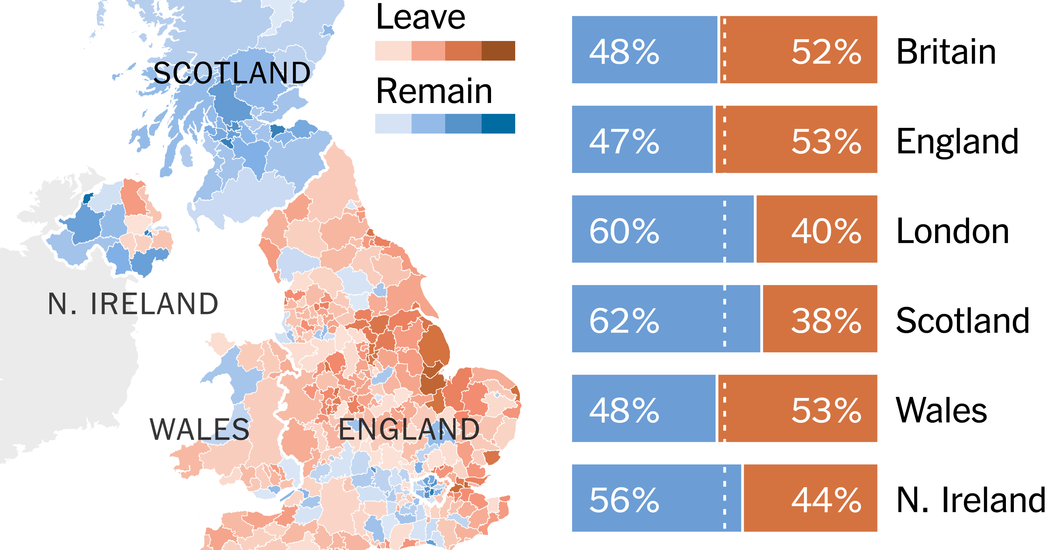What is Brexit?
- An unofficial word given to the exit of Britain from EU. A referendum to leave European Union(EU) was held in which UK has decided to leave EU.
- The process of leaving has a time limit, which ends on March 29, 2019. The UK has to negotiate with the European Commission.
Britain = England+Scotland+Wales
UK = Britain + Northern Islands
Is this the first such referendum?
- No, this is the second referendum on Britain’s relationship with the European project.
- In 1975, in a referendum on whether the U.K. should stay or leave the European Community (Common Market) Area, the country voted for staying in with a resounding 67.2 per cent vote.
What is referendum?
A referendum (in some countries synonymous with a plebiscite — or a vote on a ballot question) is a direct vote in which an entire electorate is asked to vote on a particular proposal. This may result in the adoption of a new law.
What is EU?
- The European Union is a Customs Union which has no tariffs on trade moving from one country to another within the EU.
- There are tariffs on goods from outside unless a Free Trade Agreement (FTA) has been signed (the EU and India have been negotiating on an FTA for years).
- There is also a single market, which means professional people can work anywhere within the EU no matter where they were trained.
- Health and safety rules are standardised.
Why demand for Brexit?
- People who are disadvantaged and feel left behind after the Britain collaboration with EU
- Trade and immigration policies on EU terms does not help many in Britain
- Limited trade and commerce: UK’s relation have remained limited within EU group and have been unable to progress on bilateral agreements with China, India etc.
- Multiplier -ve effect of Greece crisis to UK’s economy: Refugee absorption has resulted in stress on natural resources utilization of developed economies like UK
Its possible impacts:
- It will hurt Britain’s export competitiveness
- Markets access to Europe will be hard to negotiate and Britain would have to adhere to quality and product regulation of EU, in the context of China, Chinese products, due to their quality and price have more penetration in markets like EU
- London trade market, where trade in euro transactions are more, it would place London in a weaker position being outside of EU
- London where more people in banking, finance and insurance are from outside the country would reduce because then they will no longer be able to take their pension rights and other conveniences that a single labour market provides
- Seceding from EU, Britain would appear weak in its military prowess and its diplomatic relations, UK will remain member of NATO
What can be the possible impact on India?
Positive Impact:
- Access to UK market : With the exit, Britain will have full control over its economic policy and thus will act as a facilitator for India’s easier access to its market
- Investments : Britain on a lookout for partner countries after the exit, would find India a bright spot in the slowing world economy.
- Possibility of Bilateral Free Trade Agreement : The EU- India FTA is stuck for years and with the Brexit a possibility of entering into Bilateral FTA with the country will open up
- Relaxation from the strict quality standards that EU currently imposes which has resulted in bans on Indian products like mangoes in the past in the Union.
- Indian labour : Britain‘s industry and economic growth has benefitted from the large number of immigrants it receives due to EU refugee policy. Once the exit happens, the country will face labour shortage which could be filled by Indian labour market.
Negative Impact:
- Short term effect : Global currency volatility will affect Indian rupee as well hampering India’s trade
- Immigration controls : UK might implement immigration controls affecting large number of Indian diaspora in the country
- Would become tough for India to balance the relations between the EU and Britain
- EU countries will start imposing tariffs on British products, making it far less attractive for Indian businesses – like Tata Motors – to have a manufacturing base in the U.K
Process of Exit:
- The British Parliament has rejected the Brexit deal proposed by the Prime Minister Theresa May.
- The conservative objectors who were supporters of Brexit have also voted against the deal due to the “backstop” provisions.
- As per the Backstop provisions, Britain would leave the EU in March 2019, single market in December 2020, but stay in the customs union for longer.
- The Backstop provisions would keep trade rules between the world’s fifth-biggest economy and its largest export market almost unchanged for a transition period running to the end of 2020.
- The conservatives fear that these provisions would keep the UK too closely bound by EU regulations.
What’s next?
The UK has now three options to choose from since UK is bound to leave EU by March. The options are:
- UK can now reach to EU to further modify the agreement. But this doesn’t seem likely because EU leaders have made it clear that it was the best compromise available.
- The other option is to exit without any deal. This would be a doomsday scenario which would trigger a massive recession in Britain and markedly slow the European Union’s economic growth. This doomsday scenario would become inevitable if British parliament votes against the deal
- There could be another referendum on Brexit in Britain. Demands for another referendum is also gaining momentum since the previous one favoured the Brexit with a narrow 52 to 48 per cent
